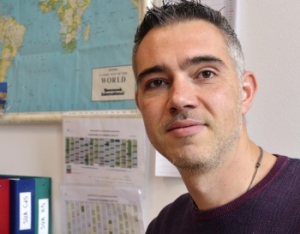The observation of our heart and brain while we sleep can provide important information for the diagnosis of widespread, chronic disorders, like insomnia, sleep apnea, hypertension and Chronic Obstructive Pulmonary Disease (COPD).

These are the findings of a research work carried out by Luca Faes. After his PhD in Electronic Devices at the University of Trento, this young researcher is currently employed in the laboratory of bio signals of BIOtech, the Center for Biomedical Technologies.
The research, “Information dynamics of brain-heart physiological networks during sleep”, signed by Luca Faes and Giandomenico Nollo of BIOtech, in cooperation with Fabrice Jurysta of the Erasmus Hospital of Brussels, and Daniele Marinazzo of the Faculty of Psychological and Pedagogical Sciences of Gent (Belgium), after being published by the “New Journal of Physics” in October, was selected by IOP Publishing, the publisher Institute of Physics listed in the special selection of particularly high scientific value (IOP select), which will be open access for one year.
The articles are chose by the Committee of the publishing company according to criteria regarding the scientific quality, the capacity to create innovation and the potentials of development for the published research work. It is recognition of the significance of the study and at the same time, an opportunity to further spread and share it at international level. Faes’ article has already been downloaded over 500 times in about two months.
Giandomenico Nollo, coordinator of the Bio signals Laboratory of BIOtech, explained that “We are proud of this recognition. The selected work is a typical multidisciplinary work, which exploits the most modern theories and techniques of information analysis to describe complex behaviours of the human physiological system. The study deals with the heart-brain interactions and brain rhythms during sleep. The study is interesting within the scientific community because the alterations of these dynamics are connected with important chronic disorders with great epidemiological impact”.
Faes’ research belongs to the area of “Network Physiology”, which deals with studies on the complexity of relations between the physiological systems, like the cardiovascular, brain and respiratory. Within this framework the presuppositions are being shaped for the physiology of systems and with an eye on the medicine of systems. Faes applied algorithms of information theory, usually used in computer science and cybernetics, to describe the complex set of interactions among the different brain rhythms, and between these and the cardiac rhythms, during the various sleep phases.
Faes explained “Brain and heart rhythms change significantly during our sleeping-waking cycles or when passing form light sleep to deep sleep to REM sleep. In general, there is a reduction of metabolism with a reduction of the cardiac and respiratory activity, and a more complex change in the brain rhythms. In our research we demonstrated for the first time how these changes are reflected in the heart-brain interactions”.
Faes tells us an example about a person suffering of sleep apnea. “If a person suffers of sleep apnea, he continuously interrupts his REM sleep phase. We demonstrated the change of the regulatory mechanisms of the heart-brain interactions and, on the middle-long term, the onset of the hypertension syndrome. We expect that the Network Physiology paradigm applied to Big Data collected on people suffering of sleep disorders will contribute to the further understanding of the integration modality among the various organs and to the finding of new diagnosis and predictive indicators of the hypertension pathologies”.
The article was published on a special edition of the “Network Physiology and Network Medicine”.


